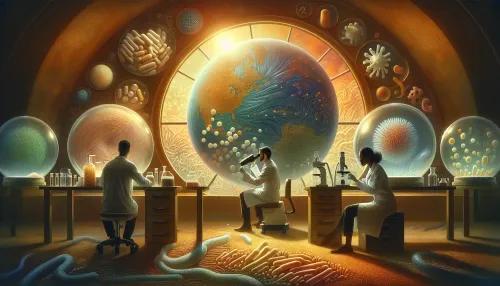
Syncing with Circadian Rhythms: Pioneering Sleep Science for Optimal Well-Being

In the quest for optimal health and wellness, the Peppino Blog explores the profound connection between our circadian rhythms and well-being. Understanding the links between sleep science and daily function isn't just a niche interest it's a vital component of modern health optimization. So, let's dive into how aligning with our internal clocks can be transformative.
Clockwork Living: Aligning Lifestyle with Natural Biological Timings
Have you ever wondered why some people are morning larks while others are night owls? Our natural biological timings, known as circadian rhythms, govern not just our sleep-wake cycle but also influence behaviors, metabolic processes, and hormonal balances.
Adopting a lifestyle that syncs with these rhythms isn't a luxury; it's necessary for maintaining physical and mental health. For example, exposing yourself to sunlight during early hours can signal your body to wake up and can aid in vitamin D synthesis. Similarly, winding down with dim lighting at night supports melatonin production for better sleep quality.
Lunar Influence on Sleep Patterns: Myth or Reality?
The moon’s phases have long been associated with various aspects of human behavior and health, including sleep. While studies provide conflicting results, some research suggests that during a full moon, individuals may experience altered sleep patterns possibly due to changes in gravitational pull or brightness.
Yet, is this lunar effect on sleep empirical truth or romanticized myth? Preliminary research hints there might be more reality to it than previously believed, though conclusive evidence remains elusive.
Genetic Markers and Sleep Propensity: Can DNA Predict Your Perfect Slumber Schedule?
At Peppino Blog, we're fascinated by how genetic makeup could dictate our ideal sleep schedule. Your genetic markers – known technically as "chronotypes" influence when you naturally feel alert or sleepy throughout a 24-hour period.
Studies have identified specific gene variants associated with being an early riser or a nocturnal type. With genetic testing becoming more accessible, individuals might soon be able to tailor their daily schedules to their DNA's whisperings for perfect slumber timing.
Cutting-Edge Chronobiology: New Frontiers in Understanding Internal Clocks
Chronobiology is the science that maps out these personal time zones we live in. As research progresses, we’re uncovering how these internal clocks are not just regulated by light but also by exercise habits, mealtimes, and even social interactions.
Scientists are now exploring novel ways to nudge these clocks when they’re out of sync such as for people suffering from jet lag or those who have overnight job shifts. These breakthroughs promise substantial benefits for holistic well-being.
Light Therapy Innovations for Countering Disrupted Circadian Rhythms
Light therapy has emerged as a beacon of hope. Bright light devices mimic natural sunlight to reset internal clocks especially useful during winter months or for those with irregular schedules that defy the sunrise-and-sunset rhythm.
These light sources are increasingly designed to be sleek and user-friendly some even adjust their brightness and color temperature automagically offering an innovative solution to keep our body's rhythms in harmony with nature.
The Role of Nutrition in Regulating Sleep-Wake Cycles
What we consume plays a significant part in how we sleep. For instance, certain nutrients are known to contribute to the production of melatonin and serotonin hormones critical for healthy sleep patterns. A balanced diet rich in omega-3 fatty acids, magnesium, and B vitamins could support regular sleep cycles.
Occupational Hazards: Mitigating Shift Work's Effect on Circadian Health
For shift workers, aligning with natural circadian rhythms can be exceptionally challenging. However, strategies such as controlled light exposure during night shifts and blackout curtains during day sleeping can minimize adverse effects on circadian health.
Organizations are beginning to take note too implementing wellness programs that educate about managing sleep hygiene under less-than-ideal conditions is one way forward in mitigating these occupational hazards.
Sleep Trackers Decoded: Empowering Individuals with Data-Driven Sleep Insights
Finally, the use of technology in the form of sleep trackers offers unprecedented insights into our rest patterns. They measure sleep duration, quality, and disturbances while tracking bedtime consistency all crucial data points for understanding our unique circadian makeup.
Data from such devices could empower individuals to make informed lifestyle adjustments or seek professional help when discrepancies arise. Being armed with this knowledge enables each of us to take control of our well-being in profound ways that align with the most cutting-edge scientific advances.


